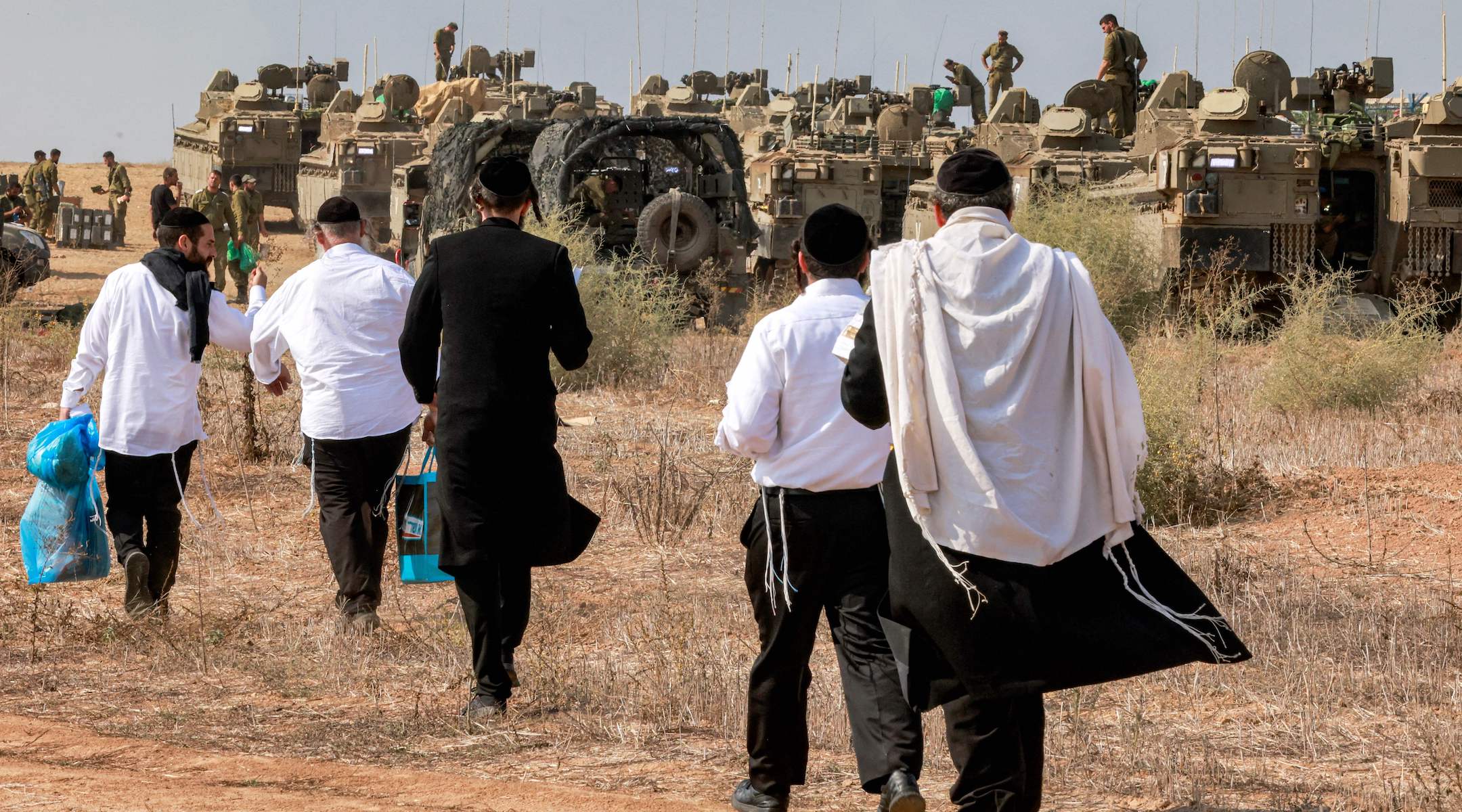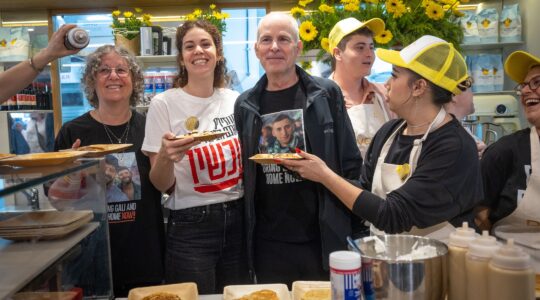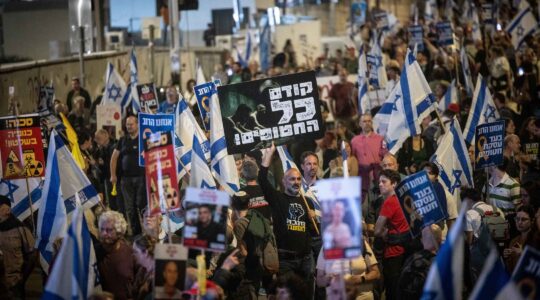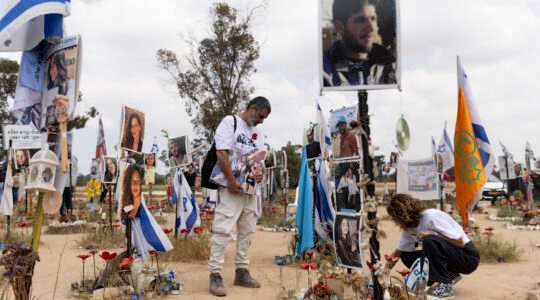BNEI BRAK, Israel (JTA) — The walls of the Ponevezh Yeshiva, in this haredi Orthodox city outside of Tel Aviv, are lined with decorative windows bearing the names of Eastern European Jewish communities destroyed during the Holocaust.
The yeshiva, a major educational institution and center of haredi, or ultra-Orthodox, life in Israel, has a history colored in tragedy. Founded in a Lithuanian city of the same name, the yeshiva was shuttered and reestablished in B’nei Brak in 1944 when many of its students and faculty were murdered in the Holocaust.
But last week, its students had a more recent tragedy in mind. As they finished Mincha, the afternoon prayer service, they recited Psalm 130 line by line, all chanting together, “From the depths I have called to you, God.”
Ponevezh’s students recited the psalm, a traditional Jewish response to times of crisis, as a plea in the wake of Hamas’ Oct. 7 attack on Israel, which killed and wounded thousands, largely civilians. After the attack, Israel declared war on the terror group and issued its largest military reserve callup in history, leading hundreds of thousands to don uniforms in a mass mobilization that has changed day-to-day life in Israel.
The attack and the war have also changed haredi society. Historically, few haredi men serve in the Israel Defense Forces, receiving an exemption from the country’s mandatory draft so that they can study Torah full-time at institutions such as Ponevezh. Some haredi communities in Israel disavow Zionism entirely out of the belief that Jews should hold sovereignty in the land of Israel only by divine ordination.
But in the wake of Oct. 7, thousands of haredi men have signed up for military service, and many more haredim have undergone their own mobilization — setting up aid operations to help soldiers and embattled communities alike. That mass eagerness to contribute, haredim say, comes from a culture of mutual aid in haredi society as well as a historical identification with the enormity of Jewish tragedy.
“The haredi community is understanding that as a nation it is important to learn Torah, but also that there is another nation that wants to destroy all of us because we are Jews, like in the Holocaust,” said Chemi Trachtenberg, 21, a haredi man who enlisted in the IDF at age 18 like his secular and religious Zionist peers. Referring to Israeli Prime Minister Benjamin Netanyahu, he said, “It doesn’t matter if you like Bibi or not, if you like the haredim or not. At the end of the day they want to kill us and we need prayers and weapons.”
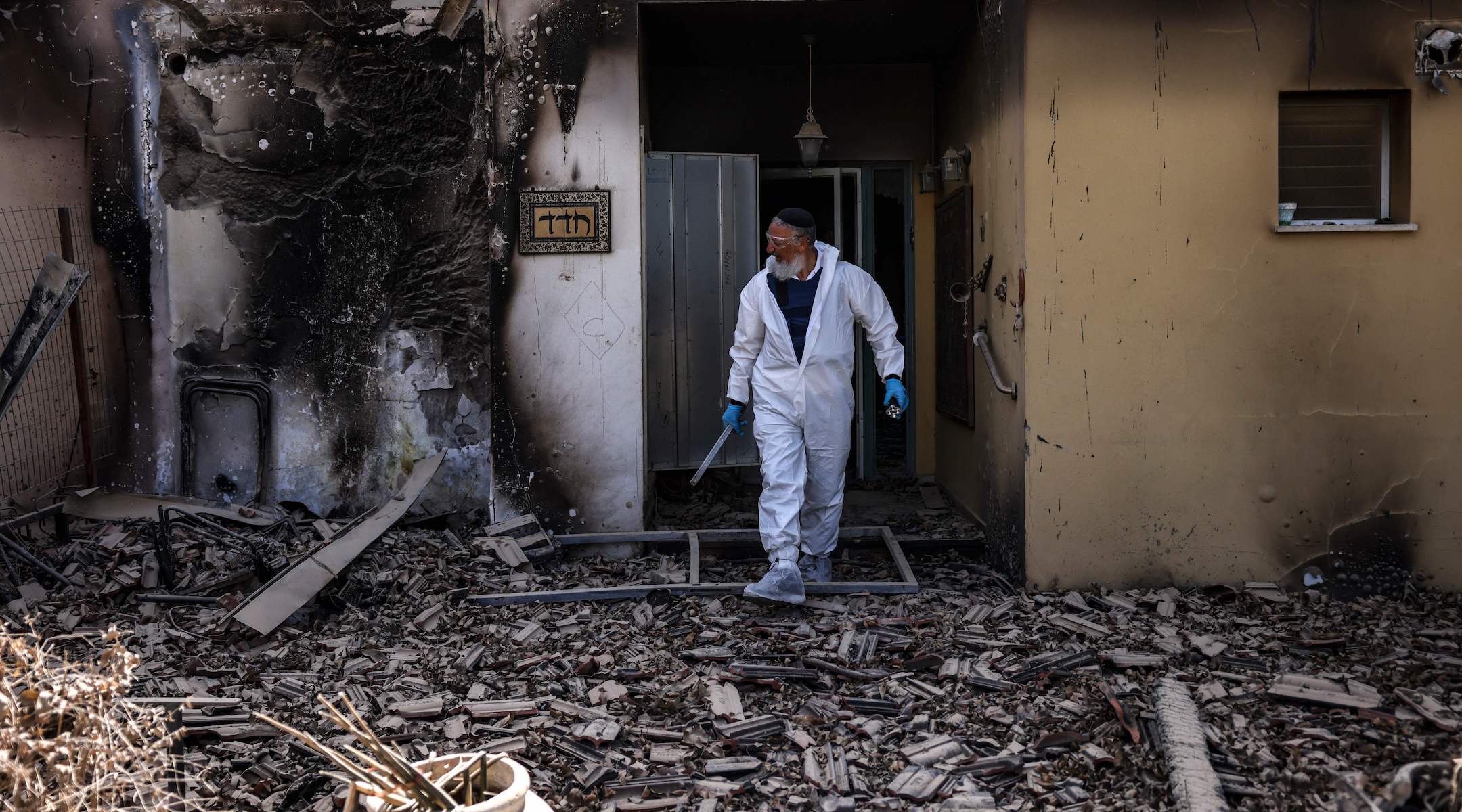
A haredi volunteer for the Zaka emergency response service searches through the debris in Kibbutz Be’eri, near the border with Gaza, on October 20, 2023. (Ronaldo Schemidt/AFP via Getty Images)
Debate over whether or not haredi men should be drafted into the IDF has riven Israeli politics and society for decades and has contributed to the rise and fall of multiple governments. As of now, the vast majority do not join the military. Last year, fewer than 10% of eligible haredi men were drafted into the IDF, as opposed to more than 80% of non-haredi Jewish men. (Arab Israelis also receive a blanket exemption from the draft.)
But since Oct. 7, more than 3,000 haredi men have volunteered to serve in non-combat roles such as the army’s medical units or the Home Front Command, which addresses national emergencies and operates services such as sirens warning of incoming rocket fire. One of the new recruits is Yaki Adamker, 33, a media personality who recently made waves after announcing on television that he would enlist after the Oct. 7 massacre.
“I believe that those who are learning from morning to night — they should continue to learn, this is my faith,” he said. “After all we went through, I asked myself, ‘Where am I? Why can’t I serve?’ Somewhere there was a black hole in me that I had to fill.”
He added, referencing the age when haredim age out of a technical requirement to complete military service, “People over 26 feel like they can’t stand on the side and simply observe.” He plans to serve in the military reserves once this war is over as well.
Rabbi Moshe Rabad, who grew up in the haredi community before enlisting in the military and serving as chief rabbi of the Air Force, helped the IDF create pathways for older haredi men to enlist and says he started getting inquiries almost immediately after Hamas’ attack.
“I turned to the army and they said to me, ‘If you bring us a list of 50 Haredim who agree, we will open something for you,’’’ he said. “This was last Tuesday at 4 p.m. We set up a meeting for 9 p.m. and I brought them a list of 300. By the beginning of the week I had 1,000 and people continue to sign up to help the army with whatever they need.”
Even more widespread than the haredi enlistment wave are a range of haredi-led initiatives to aid soldiers and civilians by cooking thousands of meals, ferrying goods and people around the country and helping out with social services in other capacities. Some haredi Israelis have organized to serve the hundreds of grieving families by helping conduct funerals and provide for shiva, the weeklong mourning period following burial.
“Israel is uniting on the way to victory,” reads a large banner ad at the top of Kikar HaShabbat, a leading haredi news website. “The IDF’s soldiers are fighting for us, and we, the haredim, are assembling to assist in any way.”
The banner ad links to an online form that asks volunteers a series of questions: Do you have a driver’s license? Do you have a car? Can you volunteer from home, an office, or another location? What type of volunteering do you want to do? The options include social media work, housing families evacuated from Israel’s border regions, medical work, guard duty, babysitting, food service and several more.
Such efforts span the gamut of Israel’s religiously and politically diverse haredi communities. Akiva Weiss, a haredi journalist, took note that the “very conservative” Vizhnitz Hasidic movement “came to the hospital to cheer up the wounded and comfort the mourning.”
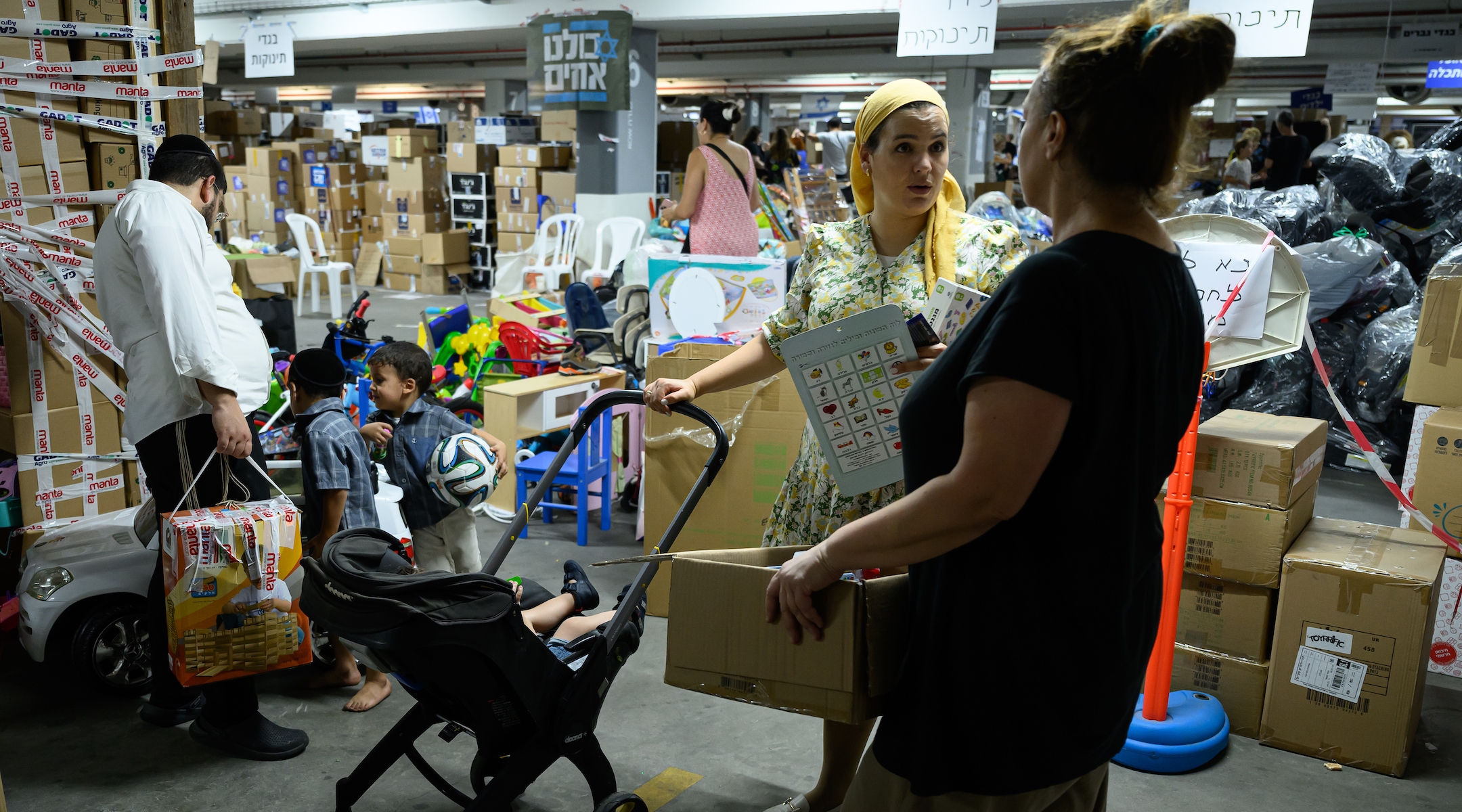
A member of the haredi community collects a selection of toys from a donation center set up for those who have been forced to flee their homes following the Hamas attacks of Oct. 7.(Leon Neal/Getty Images)
The war has also changed the schedules of haredi yeshivas. In addition to the recitation of Psalms, explains haredi journalist Yanki Farber, yeshivas canceled the remainder of an annual vacation period that lasts until the beginning of the Hebrew month of Heshvan, more than a week after the massacre occurred.
“The rabbis ruled that it is impossible for the state to be fighting and people to go on outings,” Farber said. “They told everyone to return to yeshiva,” where students and rabbis alike believe that Torah study provides spiritual protection for Israel.
Rabbinic decrees have addressed the war in other ways, guiding religiously observant Israelis in everything from carrying guns on Shabbat to whether homemade food made for soldiers should be considered kosher.
One reason haredim are eager to enlist in the military and volunteer, Farber said, is that the Oct. 7 attack directly affected haredi communities in southern Israeli cities such as Ofakim and Netivot, where some of the victims were haredi. And haredi soldiers have been killed in the fighting. Trachtenberg recalled the story of a French immigrant and haredi soldier named Binyamin Lev, whose last name means “heart,” and who was killed on Oct. 7.
“He was truly all heart and he was murdered by terrorists,” he said. “It is beautiful to see that people come from around the world to help us.”
Not everyone in the haredi community is pleased with the dramatic changes that are signaling a growing rapprochement between haredim and the military, and that may lead to the arming of haredi Israelis with weapons. Tzipi Lavi, a haredi feminist activist, is critical of the army’s special recruitment efforts that exclude haredi women. One exception, she said, is a separate project of the army, to create civil guard units in haredi cities, which has accepted women.
“They have not allowed women to draft,” she said, referring to the direct call for haredi men to enlist. “Many women tried to help but were refused.”
Lavi is especially concerned with efforts by Itamar Ben-Gvir, the far-right national security minister, who has called on Jewish Israelis to arm themselves with weapons and was filmed delivering boxes of rifles to haredi men in the town of Elad. She noted an increased danger of domestic violence.
“It bothers me to see people treating guns like a toy and dispersing weapons like rolls of bread,” she said. “The chance that people will die, mainly women, is higher than the chance that women will be saved by these weapons.”
Lavi is active in Nivcharot, a movement that advocates for haredi women to hold elected office, and is part of the centrist Yesh Atid party, which was founded in part to push for haredi inclusion in the mandatory draft. She hopes to see haredi women run for office and win following the war.
“I very much hope that in the next Knesset there will be Haredi women elected on the liberal party lists,” she said. “Haredi women can be the bridge between the haredim and liberals and Haredim and feminists, because they speak both languages and they understand how the values of both communities are important. And they can be the thread that connects the two worlds.”
Lavi isn’t alone in thinking about how the current moment in haredi communities will carry over to after the fighting. Sruli Shatz, who owns a deli in Bnei Brak serving cholent and other Eastern European Jewish delicacies, hopes “all the division” the country has experienced will recede into the past.
His wish, he said, is that “after the victory of the Jews, we will continue to be unified.”
JTA has documented Jewish history in real-time for over a century. Keep our journalism strong by joining us in supporting independent, award-winning reporting.
